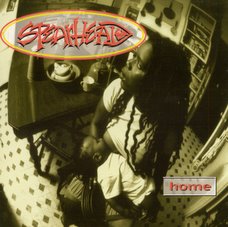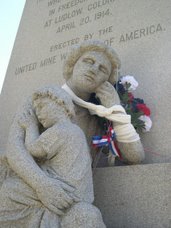The logical challenge to the nonviolent philosophy of activism is the one asking if we'd be nonviolent if our community or families were being attacked. My personal answer would be, of course not. My immediate reaction would be to defend my community, my family and myself. Even the beloved Gandhi speaks about this situation and says much the same.
The difference between protecting ourselves against attack and initiating violence against others is the difference between morality and immorality. Being the aggressors takes away any moral standing we may have had in a struggle. That's not to say being assertive isn't a moral path. Nonviolent resistance is probably the ultimate form of assertiveness.
Nonviolent resistance doesn't mean passivity. It is the direct opposite of passivity. Nonviolent resistance doesn't mean sitting in streets being ceremoniously arrested in a plan worked out ahead of time with the police. It means taking to the streets to resist the oppressor and the agents of oppression like the police.
For too long the activist movement has wanted to play by the rules of the oppressor in their resistance. They've bowed to getting permits to allow them the "right" to march against oppression. They've coordinated with police to ensure things are "orderly" when the resistance is meant to bring disorder to a failed system. Activists have allowed police to be part of their strategy in resistance. This leads me to the analogy of inviting the fox into the henhouse to help plan a defense against the intrusion and violence of the fox.
Nonviolent resistance can and should target the icons of oppression. Companies like Shell, Halliburton and Fox are all complicit partners in oppression. Wal-Mart and other corporate giants have oppressed workers since the founding of their companies. Political action groups like AIPAC have bastardized access to elected officials and bought public policy. Foreign policy has been dictated by companies and organizations that make huge profits from the policies of never-ending wars.
Martin Luther King and the civil rights workers targeted Woolworths' refusing to seat blacks at their lunch counters. They didn't target the federal government or local government first. They started at the local and corporate level. They started at the level that would ignite the flame of perceived injustice being carried out in the everyday lives of people oppressed.
The flame was lighted by Rosa Parks being forced to stand when empty seats were available in the "white only" part of the bus. She was tired from working hard and for wages that hardly paid the bills. She challenged an oppressive and injust law by taking a seat in the "front" of the bus. Her arrest clearly highlighted the oppression of the segregated South. Her simple, noviolent action was heard around the community and around the nation.
The differences between the civil rights movement and the current movement are dramatic. The eventual diversity of the civil rights movement compared to the current activist movement stand out. The strategies of organizing locally and building by actions that address local issues are different from the march and rally shows against national policies today.
But the issue is Iraq and Afghanistan....Israel and Palestine the movement says. Those issues are surely foremost in a global sense but they trickle down to our local communities. Young men and women are induced into the military locally because they can't find adequate jobs or education. The money for such programs go into the war machine. Crippling the war machine has to be done by preventing it from taking our young people in a back door draft. Crippling the war machine has to be done by insisting local companies take precendence over huge corporate giants that contribute heavily toward war. Crippling the war machine has to be done by demanding local officials refrain from supporting the war economy. It has to be done by fighting for those oppressed locally so they can be enlisted to move on a grander scale against the larger oppressors.
It certainly isn't hard to find local oppression. Police brutality, substandard housing, substandard wages, substandard schools and the ongoing decline of inner cities while rich oppressors flee to the suburbs are but a small example of local injustices and oppression. The most oppresed locally and nationally are people of color and those of non-European ethnicity. Supporting this diverse population only makes sense to build any activist community. It's like planting seeds in the spring to see the the harvest in the fall. If we plant the seed of community caring and support that comes from all sectors of the community we have a rich harvest of activists.
Unfortunately, professional activists from the old Vietnam era movement has taken root and failed to remember the diversity needed to get the attention on the national level. Martin Luther King rallied his followers to join against the war. The Black Panthers were included in the movement. The Brown Berets and LaRaza were part of the movement.
Today we seem to work in separate issue groups that seldom acknowledge the need to connect all the issues as part of the overall oppression going on in this nation and around the world. Gay rights are part of human rights. Immigration rights are part of human rights and the labor struggle. Police brutality is part of racism and violence toward the disenfranchised. Police brutality is part of overall fear to dissent and challenge oppression and injustice. The issues are all interconnected and the activists should be as well for a movement to actually be effective.
Nonviolent action and resistance is not passive. It is assertive and doesn't back down even when violence is directed toward it. I feel strongly about protecting myself and others against violence directed toward us. I'm not going to sit at the curb and allow myself or others to be brutalized without attempting to stop the attacker. But I won't join in the planned attack of others to effect a temporary victory for change. That mentality of retaliation and reprisal is the problem we see in Iraq, Afghanistan, Israel and Gaza, among other places in the world. Violence truly does beget violence and I can't work with organizations that include violence as part of the strategy of effecting change. I did that once. It was called the Marine Corps.
Subscribe to:
Post Comments (Atom)













No comments:
Post a Comment